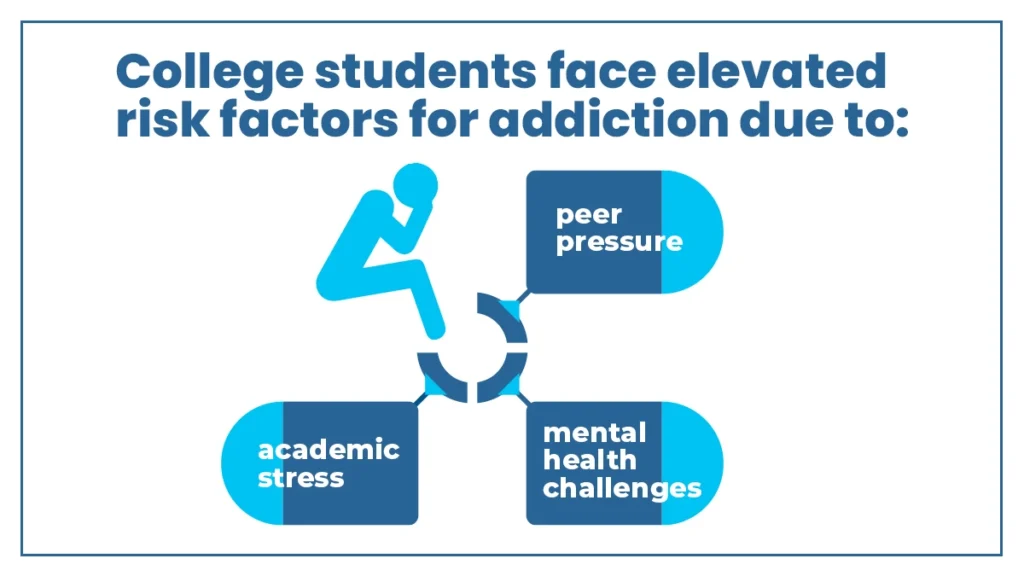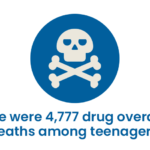Like a multifaceted prism, college life refracts an array of influences. Navigating through academic pressures and complex social dynamics can be challenging. Navigating the journey of dependency can be a challenging experience as it involves navigating through unexplored emotional terrains.
As we tackle this groundbreaking odyssey, we aim to shatter old paradigms and redefine our understanding of college student addiction in a manner never conceived. Continue reading as we endeavor to illuminate the shadows of addiction in the context of higher education.

Key Takeaways
Substance abuse is a significant issue on college campuses in the US. It occurs when students excessively and harmfully use drugs or alcohol.
- College students face elevated risk factors for addiction due to peer pressure, academic stress, and mental health challenges.
- Education, awareness, and healthy coping mechanisms are essential in preventing addiction among students.
- Combining counseling, medication, and support groups can help students recover from addiction and regain control of their lives.
Seek help from specialized facilities like The Haven Detox-South Florida. Contact us at (561) 328-8627 for expert guidance and support on your path to recovery.
Addiction Statistics on College Campuses
Substance use on college campuses is a significant concern in the United States. According to National Institute on Drug Abuse (NIDA) data, approximately 38 percent of college students reported using illicit drugs in the past year. Among these, marijuana and prescription drugs are most commonly abused.
Excessive alcohol consumption is also widespread. The National Institute on Alcohol Abuse and Alcoholism (NIAAA) reveals that about 60 percent of college students aged 18-22 depleted alcohol in the past month, with roughly two in three engaging in binge drinking.
Recent studies and national surveys have shed light on mental illness, drug use, and alcohol addiction among young people, especially full-time college students. These surveys reveal an increased risk of addiction, particularly regarding prescription stimulants and alcohol.
With such high-risk factors, understanding the available treatment options is crucial. The data also highlights the alarming use of illegal drugs and marijuana among this demographic, emphasizing the urgent need for comprehensive prevention and support programs.
Furthermore, the Substance Abuse and Mental Health Services Administration (SAMHSA) reports that about 10 percent of college students struggle with a substance use disorder. This prevalence highlights the urgent need for prevention and intervention efforts on college campuses.
Substance use is pervasive among college students, necessitating comprehensive strategies and support systems to address the problem effectively. These statistics underscore the critical need to address the issue more diligently.
Substance Abuse Among College Students
Substance abuse among college students is a concerning issue. It happens when students use drugs or alcohol excessively and harmfully. It can lead to various problems like health issues, poor academic performance, and legal troubles.
Common substances abused are alcohol, marijuana, prescription drugs, and stimulants. Stress, peer pressure, and easy access contribute to this problem. It’s essential to understand the signs of substance abuse, such as neglecting responsibilities, changes in behavior, and withdrawal from social activities.
Prevention and support are crucial. Colleges often have resources like counseling services and support groups. Friends and family should encourage seeking help if they suspect a problem.
Substance abuse is a significant concern among college students, affecting their health and academics. Campuses offer support through counseling services. Awareness, early detection, and support are essential in addressing this issue.
Factors Contributing to Addiction Among College Students
Addiction factors among college students in the United States are influenced by various elements that can lead to substance misuse or behavioral addiction. It is essential to comprehend these factors to prevent and address addiction problems effectively.
Three significant contributors are peer pressure, mental health, and academic pressure.
Peer Pressure
Peer pressure happens when college students feel influenced by their friends or peers to engage in activities they may not want to, including substance use. Many students want to fit in or be accepted by their peers, making them more susceptible to trying drugs or alcohol. It can lead to experimentation and continued use of substances, often as a way to maintain social connections or cope with the fear of rejection.
Mental Health
Mental health refers to emotional and psychological well-being. It’s common for college students to experience stress, anxiety, depression, and other mental health disorders. Students with mental health issues may use substances to self-medicate to alleviate their emotional pain or distress. Using substances to cope can lead to addiction and exacerbate mental health problems, creating a harmful cycle.
Academic Pressure
Academic pressure encompasses the stress and high expectations that students face in their pursuit of good grades and success in college.
The pressure to perform well academically can be overwhelming, leading some students to seek relief through substance use. Substance abuse can hinder academic performance, creating a destructive cycle of academic stress and substance reliance.
Colleges and universities should provide support systems, including counseling favors and educational programs, to help students cope with peer pressure, manage their mental health, and navigate academic challenges without addiction.
Additionally, raising awareness among students and promoting healthy coping strategies can contribute to a safer and more prosperous college experience.
Impact of Addiction on College Students
The impact of addiction on college students in the United States is significant and far-reaching. It affects their academic performance, physical health, and psychological and emotional well-being.
Academic Consequences
Addiction often leads to difficulties in managing academic responsibilities, such as attending classes, studying, and meeting deadlines. Students struggling with addiction may experience lower grades, drop out of courses, or even face academic probation or expulsion. These academic setbacks can hinder their future career prospects and financial stability.
Physical Health Implications
Substance abuse can harm a student’s physical health. It includes problems like liver damage, heart issues, and a weakened immune system. Poor health can disrupt a student’s ability to attend classes and engage in campus activities. Long-term health consequences may persist beyond college and affect their overall quality of life.
Psychological and Emotional Toll
Addiction can affect a student’s mental health, causing anxiety, depression, and heightened stress. These mental health disorders can lead to a vicious cycle where substance use is used as a coping mechanism, worsening the addiction. The psychological and emotional struggles can negatively impact relationships, self-esteem, and happiness.
It’s essential to foster an environment where students feel comfortable seeking help for addiction-related issues. They should have access to the necessary resources to overcome these challenges.
Addiction Prevention Strategies
Preventing addiction among all people, including college students in the United States, involves implementing effective strategies. Here are three vital approaches:
Education and Awareness
Educating young adults about the risks and consequences of addiction is essential. Many people may not fully understand the dangers of substance misuse or behavioral addictions. Increased awareness can help individuals make informed decisions, recognize early warning signs, and seek help when needed.
Healthy Coping Mechanisms
Encouraging the development of healthy ways to cope with stress, anxiety, and peer pressure is crucial. When people have constructive ways to manage life’s challenges, they are less likely to turn to substances for relief. Promoting activities like exercise, mindfulness, and seeking social support can build resilience and reduce the risk of addiction.
Policies and Regulation
Governments and institutions can create and enforce policies and regulations to control access to addictive substances and promote responsible behavior. These policies can limit the availability of harmful substances and discourage behaviors that lead to addiction. Effective policies can reduce the prevalence of addiction and protect vulnerable populations.
When implemented collectively, these strategies can help prevent addiction and create a safer environment for everyone, especially college students. Education and awareness campaigns should be widely accessible, focusing on the risks associated with addiction.
Teaching individuals to develop healthy coping mechanisms can empower them to make better choices. Additionally, well-enforced policies and regulations can play a crucial role in reducing the availability and appeal of addictive substances, making it more challenging for addiction to take hold.
Effective Treatment Options for Students
Treating students facing addiction in the United States involves various approaches geared toward helping them overcome challenges. Here are three essential methods:
Counseling and Therapy
Counseling and therapy sessions provide a safe space for students to discuss their addiction-related issues with trained professionals. These sessions aid students in comprehending the underlying factors of their addiction and formulating techniques to handle triggers and cravings. Counseling and therapy can effectively promote recovery and prevent relapse.
Medication
Sometimes, healthcare providers prescribe medication to help manage withdrawal symptoms or cravings. Medicine can be critical to addiction treatment, particularly for substances like opioids or alcohol. Medication can increase the chances of successful recovery when used as part of a comprehensive treatment plan.
Support Groups
Support groups bring together individuals facing similar addiction challenges to share experiences and provide mutual support. These groups offer a sense of community and understanding, reducing feelings of isolation. Being part of a support group can enhance motivation and provide valuable insights into recovery strategies.
These treatment methods are tailored to individual needs and can offer the best chance for recovery among students. Counseling and therapy help address the psychological aspects of addiction, medication assists in managing physical symptoms, and support groups provide a sense of belonging and encouragement for recovery. Students must seek help and find the right combination of treatments to address their addiction effectively.
Frequently Asked Questions (FAQ)
What percentage of college students struggle with addiction?
The prevalence of addiction among college students in the United States varies. Still, research indicates that approximately 22 percent of college students engage in heavy episodic drinking (binge drinking) at some point during their college years.
Rates of substance use disorders can be lower but still significant, affecting a notable portion of the college population. However, it’s essential to note that the exact percentage may fluctuate over time and across different campuses due to various factors such as location, demographics, and access to support services.
What are the risk factors for addiction potential among college students?
Several risk factors increase the potential for addiction among college students. Peer pressure plays a significant role, as students may feel compelled to fit in and partake in substance use.
Mental health issues (anxiety or depression) can also heighten vulnerability to addiction. Academic stress, easy access to alcohol and drugs, and a lack of coping skills further contribute to the risk.
Additionally, a family history of addiction can predispose students to substance misuse. Addressing these risk factors is vital for prevention and early intervention efforts on college campuses.
Comeback Begins Here: Join The Haven Detox-South Florida
If addiction is making it tough to keep up with your studies and college life, don’t worry. We can help you start a new chapter and get back on track. At The Haven Detox-South Florida, we’re not just a facility. We’re your partners in transformation.
We offer you programs like residential care, where, from detox to withdrawal management, we nurture your progress and be with you every step of the way. Our aim is to assist you with the power of tools like SMART Recovery in your journey, empowering you to reclaim the reins of your life.
Join us for addiction treatment and recovery support. Contact us today at (561) 328-8627 because your education and well-being matter to us.











